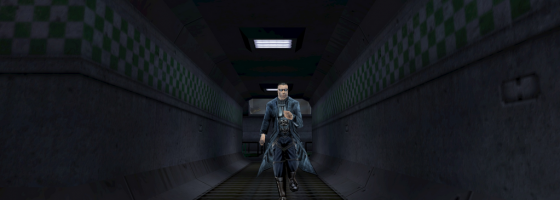When we talk about choices in video games, for the longest time we referred to them as strategic or tactical options. The only games that gave players more personal choices were RPGs, but even then your actual input in the game was limited. But in 2000, we saw the release of Deus Ex and one of the few games to really give the player freedom in choice.
A Genre Mix-up:
Deus Ex, developed by Ion Storm was a first person shooter that allowed players to make far reaching decisions both from a gameplay and narrative point of view.
Players could talk with other characters and make decisions that would change the path of the story. While combat was always done in first person, the player had multiple options for how to proceed and improve over the course of the game.
Upgrades could be applied to a variety of areas: jumping, shooting, hacking and many more that would offer the player more options both in exploring and combat. The game was designed so that the player could not upgrade everything, forcing them to pick a path and stick with it.
Beyond the general gameplay, the level design was a pivotal reason for the game’s open ended design. Instead of areas built around long corridors, the sections in Deus Ex were wide. A building may have had three or more different ways of moving in and out of it. As a player that meant that you didn’t have to rely on shooting all the time or stealth, but on however you upgraded JC Denton.
Deus Ex was one the first games outside of the strategy genre, where the player had the power to choose their path through the game based on their preferences and tactics. Not to be confused with titles that offered the player customization, but they still had to follow a set path. Deus Ex even had boss battles that could be handled differently based on how the player went through each level.
Deus Ex, while inspirational for a lot of different games, didn’t set the game design world on fire. As following the release, we didn’t see Deus Ex’s design featured in other titles like how Grand Theft Auto 3 ignited the open world genre.
The simplest reason is that creating a game like Deus Ex: where the player has all this freedom is difficult compared to a linear game.The more freedom you give someone in how to play, the more difficulties in game balance you invite. Not to mention that Deus Ex‘s sequel failed to live up to expectations and shut down future development of games in the series until 2011.
One title that came close to Deus Ex, was Alpha Protocol that allowed the player to choose their own way through the story. However, it was extremely limited compared to the freedom offered in Deus Ex.
The recent reboot with Deus Ex: Human Revolution was a largely successful title that came the closest to matching the original game. The only catch were the boss fights that were universally hated due to how constrained they were in design.
I wish I could say that things have gone great for Deus Ex‘s designer Warren Spector, but after the problems with Epic Mickey 1 and 2 his newest studio was closed down.
Deus Ex managed to get a lot of elements right and hopefully with the renewed success in the franchise thanks to Human Revolution there will be more games coming.



Pingback: Game Design Encyclopedia Volume 1: The Foreword | Game Wisdom()